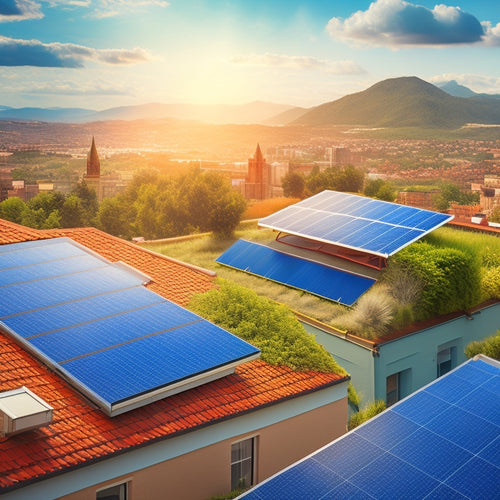
Revolutionizing Transportation: The Power of Electric Vehicles
Share
Electric vehicles are transforming the transportation landscape with exceptional energy efficiency, zero tailpipe emissions, and improved performance. Operating on rechargeable battery packs, electric vehicles convert stored electricity into mechanical energy, harnessing advanced battery technology for efficient energy storage and release. As the automotive industry shifts towards electrification, collaboration is key to accelerating adoption and reducing greenhouse gas emissions. With sustainable transportation practices and benefits for governments, manufacturers, and consumers, the electric revolution is poised to transform the sector. As the industry converges on a cleaner, more sustainable future, the implications for transportation and the environment will be far-reaching, with much more to explore.
Key Takeaways
• Electric vehicles offer exceptional energy efficiency, converting over 77% of electrical energy into power, reducing energy waste and emissions.
• Zero tailpipe emissions from electric vehicles reduce air pollution and greenhouse gas emissions, contributing to a cleaner environment.
• Advanced battery technology enables efficient energy storage and release, allowing for smooth, quiet, and powerful operation.
• Electric vehicles promote sustainable transportation practices, reducing reliance on fossil fuels and mitigating climate change.
• Collaboration between governments, manufacturers, and consumers is crucial to accelerate adoption and realize the full potential of electric vehicles.
Benefits of Electric Vehicles
In addition, one of the most significant advantages of electric vehicles is their exceptional energy efficiency, with the ability to convert over 77% of electrical energy to power at the wheels, making them a more environmentally friendly option compared to traditional gasoline-powered vehicles.
This remarkable efficiency translates to a reduced environmental impact, as EVs produce zero tailpipe emissions, decreasing air pollution and greenhouse gas emissions. By switching to clean energy, EVs contribute to a cleaner environment, improving air quality and mitigating climate change.
Moreover, EVs offer improved performance, with quiet and smooth operation, and stronger acceleration. Overall, electric vehicles provide a compelling solution for those seeking a more sustainable and environmentally conscious mode of transportation, aligning with the values of serving others and promoting a cleaner, healthier environment.
How Electric Vehicles Work
Electric vehicles operate by harnessing the power stored in rechargeable battery packs, which fuel one or more electric motors that propel the vehicle.
The electricity stored in the battery packs is converted into mechanical energy through an electricity conversion process, allowing the electric motor to generate torque and propel the vehicle.
Advanced battery technology enables efficient energy storage and release, making electric vehicles a viable option for transportation.
The electric motor's high torque output provides smooth and quiet operation, while the regenerative braking system captures kinetic energy and converts it back into electrical energy, further increasing efficiency.
Embracing the Electric Revolution
As the automotive industry undergoes a seismic shift towards electrification, governments, manufacturers, and consumers alike are poised to reap the benefits of a revolution that promises to transform the way we travel.
Embracing the electric revolution requires a collaborative effort to accelerate the adoption of electric vehicles (EVs). This future technology holds immense potential in mitigating environmental impact by reducing greenhouse gas emissions and promoting sustainable transportation.
Frequently Asked Questions
Can I Charge My EV at a Friend's House Without Their Permission?
When considering charging an EV at a friend's house, it's crucial to respect Etiquette Expectations and Homeowner Rights, seeking permission prior to charging to avoid potential conflicts and guarantee a mutually respectful experience.
Are There Any EV Models Available With Longer Battery Warranties?
Several EV models offer extended battery warranties, ensuring battery durability; for instance, Hyundai and Kia provide an 8-year, 100,000-mile warranty, while Nissan offers an 8-year, 100,000-mile warranty on its Leaf model.
How Do I Ensure My Home's Electrical System Can Support EV Charging?
To guarantee your home's electrical system can support EV charging, assess your wiring capacity and consider circuit upgrades, consulting a licensed electrician to determine necessary modifications for safe and efficient charging.
Can I Install an EV Charging Station in a Rented Property?
As a renter, installing an EV charging station requires careful consideration of renter's rights and landlord agreements, ensuring mutual understanding and consent to avoid potential disputes and facilitate a harmonious installation process.
Are There Any Ev-Specific Parking Regulations in Residential Areas?
In residential areas, EV-specific parking regulations often involve designated parking permits, residential restrictions, and access controls to guarantee authorized EV charging, while complying with local ordinances and building codes.
Related Posts
-

3 Sun-Powered Automated Shades for Energy-Savvy Homes
You're looking to change your home into an energy-savvy haven, and sun-powered automated shades are an essential step...
-

7 Best Home Hydrogen Fuel Cells for Clean Power
You're considering adopting hydrogen fuel cells for clean power at home, but you want to know the best options. Reput...
-

What Roofing Materials Best Protect Our Planet?
As you consider the environmental impact of your building, you're likely to find that the roofing material you choose...


